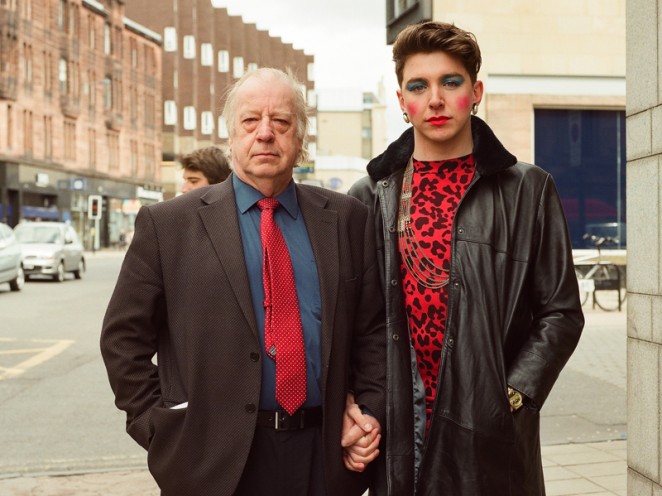Rosana is wearing a magenta-coloured coat, which matches my magenta-coloured skirt and tights. We laugh about this as we walk along hand-in-hand through the streets of Brighton. She asks me what I think people might suppose our relationship to be. I suggest that because we are wearing the same colour, they might think we’re members of some strange new cult. Or that we’re performance artists. Or that we’re lovers who like to dress in matching clothes. We cross into Kemptown – gay capital of England, so unlikely two women holding hands is going to cause much of a stir there. She takes me into a sex-shop for gay men, and Rosana remarks on this being on a high street, open access to all. I remark that it’s all pretty normal here. We’re standing in front of a shop window looking at our reflections, chatting away nineteen to the dozen, when someone else joins us – and with something of a shock, I’m whisked away by a young man called Felix. I can hardly talk to him at first, I want my new best friend Rosana back, but after a few moments I’ve readjusted. And so it goes.
An hour later, I’m on the beach. I’ve been around gardens, through shopping arcades, and down the pier. I’ve held hands with very many people: men and women of different ethnicities, ages and sexual identities (some of which are stated upfront, some not referred to, or subtly suggested). It’s a bit like speed-dating. I’m asked the same questions many times over, and sometimes I tire of telling my own stories: Yes, I’m from Brighton, although from London originally. Yes, I like it here. No, I don’t find it odd to be holding hands with another woman/a younger man/anybody actually in public. Yes, I often hold hands with people.
Art mirrors life: In Walking:Holding we are constantly thrown back, Groundhog Day-like, to the first ten minutes of a new relationship. With some people, conversation’s a little strained, there’s not a lot of instant chemistry, although everyone is lovely, and I’m more than happy to hold everyone’s hand. With other people, it’s straight in, and you find yourself talking non-stop about all sorts of things – you realise it is working best when you are finding out as much about them as they are about you, or when you are walking along without talking because you don’t actually need to say anything in that moment.
It is an intimate experience – the walking hand-in-hand and the talking. It is hard to be engaged in a one-on-one theatrical encounter of this sort without thinking about dearly departed Adrian Howells, one of the pioneers of this form of performative encounter (and like Rosana Cade, he lived and worked in Glasgow – if I had had more time with her I would have asked if she knew him). His name is in my heart and on my lips throughout this experience. Reaching back in time, I can feel his hand in mine. I feel the print of many other hands on my hands over the years – friends, lovers, children, parents, dance partners, art partners.
There are reminders of artistic precedents, of work by other artists that offers an intimate encounter through performative walks: Zecora Ura’s Drift and BR_116 projects; Wrights & Sites, Katie Etheridge and Gustavo Ciriaco; Cambar Coletivo’s Urban Labyrinth. It’s a growing area of work. What all these artists have in common is an interest in walking without the theatrical artifice of fictional characters or scenarios – an encounter with the real world in tandem with one or more real people. Rosana Cade’s Walking:Holding holds its own in this venerable list. When I walk with her, the echo of these other footfalls is with me. There are also resonances, in the decision to frame the holding of hands as a potentially subversive act, to the work of choreographers Bill T Jones and Arnie Zane, who held up the simple image of two men (both gay, one white and one black) holding hands as the ultimate political statement. I muse with one new friend on how the same simple, human act – holding hands – can be perceived so differently in different cultures. Holding hands with the ‘wrong’ person could get you shot, stoned, raped, ridiculed, imprisoned.
Before I start out on my walk, I have a conversation with someone about technology-driven art pieces, voicing my frustration at being left to my own devices with an MP3 or GPS navigation system. As I walk, I think: how much nicer it is to have someone to hold hands with as you navigate the urban landscape. And to be passed from hand to hand, like a lovingly held child owned by the whole world. What a pleasure, what a privilege.

